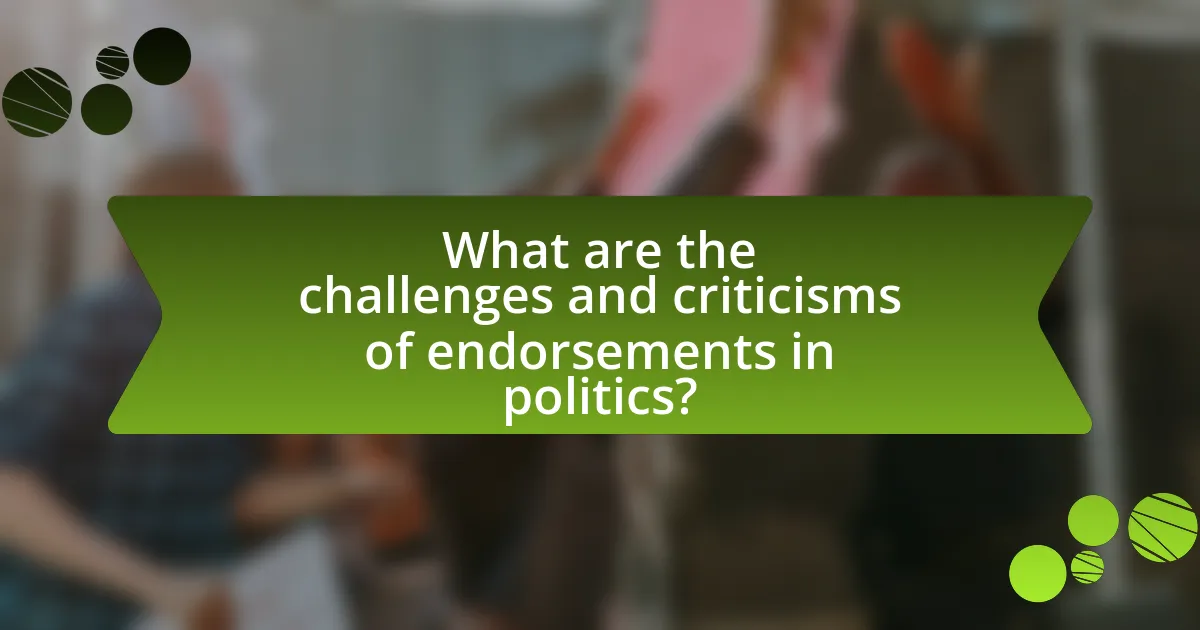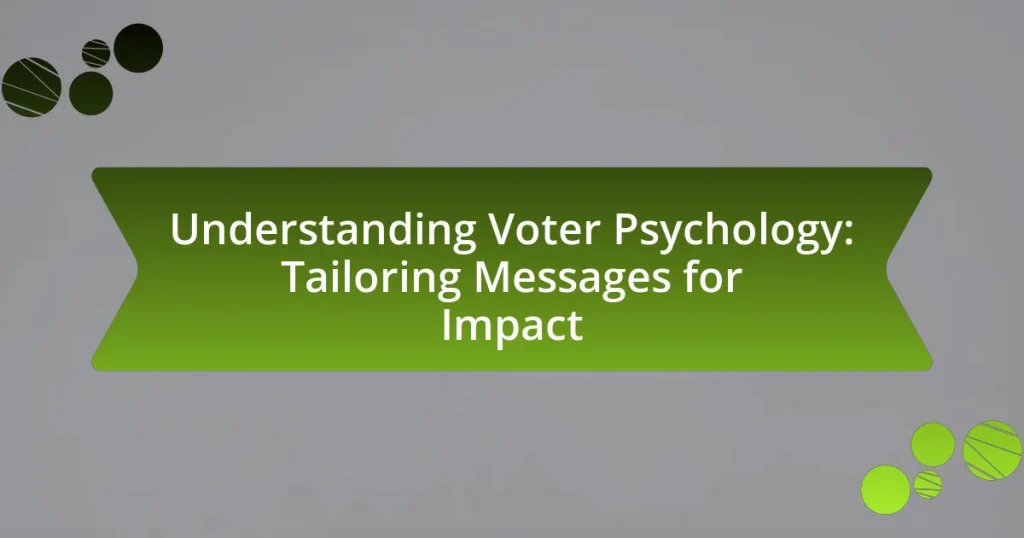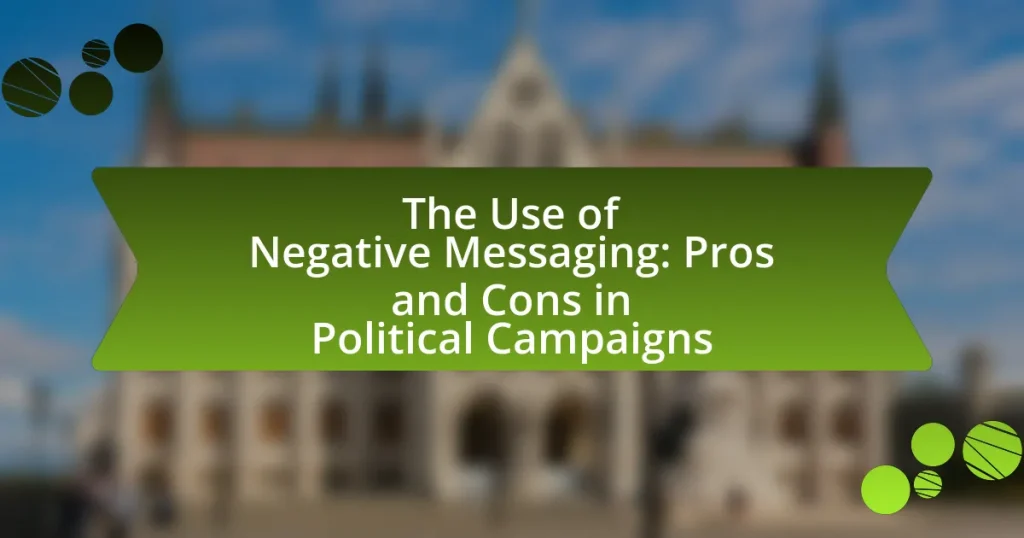The article examines the critical role of endorsements in shaping political messages and influencing voter perceptions. It highlights how endorsements from respected figures or organizations enhance a candidate’s credibility, increase media coverage, and sway public opinion, as evidenced by historical examples like Barack Obama’s 2008 presidential campaign. The discussion includes the psychological factors that make endorsements effective, the types of endorsements, and their impact on campaign funding and visibility. Additionally, the article addresses the challenges and ethical concerns surrounding endorsements, emphasizing their potential to mislead voters and the implications of endorsements from controversial figures.

What is the role of endorsements in shaping political messages?
Endorsements play a crucial role in shaping political messages by lending credibility and influence to candidates. When a respected figure or organization endorses a candidate, it can significantly sway public opinion and enhance the candidate’s perceived legitimacy. For instance, endorsements from prominent political figures or organizations can lead to increased media coverage and voter trust, as seen in the 2008 U.S. presidential election when Barack Obama received endorsements from influential figures like Ted Kennedy, which helped solidify his position among undecided voters. This demonstrates that endorsements not only amplify a candidate’s message but also help to frame the narrative around their campaign, making them a vital component of political strategy.
How do endorsements influence voter perceptions?
Endorsements significantly influence voter perceptions by enhancing the credibility and appeal of candidates. When a respected individual or organization endorses a candidate, it often leads voters to view that candidate more favorably, as endorsements serve as a heuristic or shortcut for decision-making. Research indicates that endorsements can increase a candidate’s perceived competence and trustworthiness, which are critical factors in voter decision-making. For instance, a study published in the American Political Science Review found that candidates endorsed by well-known figures experienced a measurable increase in voter support, demonstrating the tangible impact of endorsements on electoral outcomes.
What psychological factors make endorsements effective?
Endorsements are effective due to several psychological factors, including credibility, social proof, and emotional appeal. Credibility arises when the endorser is perceived as trustworthy and knowledgeable, which enhances the persuasive power of the message. For instance, a study by Eagly and Chaiken (1993) highlights that individuals are more likely to be influenced by sources they view as credible. Social proof plays a role as people tend to follow the actions or beliefs of others, especially those they admire or respect; this is supported by Cialdini’s principles of influence, which indicate that endorsements can create a bandwagon effect. Emotional appeal is another critical factor, as endorsements that evoke strong feelings can lead to greater engagement and persuasion, as shown in research by Brader (2006), which found that emotionally charged political messages are more likely to resonate with voters. These psychological factors collectively enhance the effectiveness of endorsements in shaping political messages.
How do endorsements alter the credibility of political messages?
Endorsements significantly enhance the credibility of political messages by associating them with trusted figures or organizations. When a well-respected individual or group publicly supports a candidate or policy, it signals to the audience that the message is reliable and worthy of consideration. Research indicates that endorsements can increase voter trust; for instance, a study by the Pew Research Center found that 70% of voters are influenced by endorsements from people they admire. This influence stems from the perception that endorsed messages are validated by the authority or expertise of the endorser, thereby increasing their persuasive power.
Why are endorsements important in political campaigns?
Endorsements are important in political campaigns because they lend credibility and influence to a candidate, often swaying undecided voters. When a respected figure or organization publicly supports a candidate, it can enhance the candidate’s image and signal to voters that they are a viable choice. For example, endorsements from prominent political leaders or organizations can lead to increased media coverage and public interest, as seen in the 2008 presidential campaign when Barack Obama received endorsements from influential figures like Ted Kennedy, which helped solidify his position among Democratic voters.
What impact do endorsements have on campaign funding?
Endorsements significantly enhance campaign funding by increasing a candidate’s credibility and attracting financial contributions. When influential figures or organizations endorse a candidate, it often leads to a surge in donations, as supporters feel more confident in their choice. For instance, a study by the Center for Responsive Politics found that candidates who receive endorsements from prominent political figures can see an increase in fundraising by up to 30%. This correlation between endorsements and funding is evident in various election cycles, where endorsed candidates consistently outpace their opponents in financial support.
How do endorsements affect candidate visibility and media coverage?
Endorsements significantly enhance candidate visibility and media coverage by leveraging the credibility and reach of the endorsing individuals or organizations. When a prominent figure or institution endorses a candidate, it often leads to increased media attention, as journalists seek to cover the implications of the endorsement. For instance, a study by the Pew Research Center found that candidates who receive endorsements from well-known political figures experience a 30% increase in media mentions compared to those without endorsements. This heightened visibility can translate into greater public awareness and support, as endorsements often signal to voters that the candidate is a viable choice.
What types of endorsements exist in political contexts?
In political contexts, the main types of endorsements include individual endorsements, organizational endorsements, and issue-based endorsements. Individual endorsements come from prominent figures, such as politicians, celebrities, or community leaders, who publicly support a candidate or policy. Organizational endorsements are provided by groups, such as political parties, labor unions, or advocacy organizations, which lend their credibility to a candidate or cause. Issue-based endorsements focus on specific policies or legislative proposals, where organizations or individuals express support based on alignment with their values or objectives. These endorsements significantly influence voter perceptions and can enhance a candidate’s legitimacy and appeal.
How do celebrity endorsements differ from institutional endorsements?
Celebrity endorsements differ from institutional endorsements primarily in their source of authority and influence. Celebrities leverage their personal brand and public appeal to connect with audiences on an emotional level, often leading to increased relatability and engagement. In contrast, institutional endorsements derive credibility from the organization’s reputation and expertise, aiming to convey trustworthiness and reliability in a more formal context. For example, a celebrity like Oprah Winfrey endorsing a political candidate can create a personal connection with voters, while an endorsement from an established organization like the American Medical Association emphasizes the candidate’s policies on healthcare based on expert opinion. This distinction highlights how the nature of the endorser affects the message’s reception and impact on public perception.
What role do grassroots endorsements play in local elections?
Grassroots endorsements play a crucial role in local elections by enhancing candidate credibility and mobilizing voter support. These endorsements, often from community leaders or local organizations, signal to voters that a candidate has the backing of trusted figures within their community. Research indicates that candidates with grassroots endorsements can experience increased voter turnout; for instance, a study by the Pew Research Center found that local endorsements can boost a candidate’s visibility and perceived relatability, leading to a more engaged electorate. Additionally, grassroots endorsements can help candidates differentiate themselves from opponents by aligning with specific community values and issues, thereby shaping their political messages effectively.

How do endorsements interact with political messaging strategies?
Endorsements significantly enhance political messaging strategies by lending credibility and authority to candidates. When a respected figure or organization endorses a candidate, it can influence public perception and voter behavior, as seen in the 2008 U.S. presidential election when endorsements from prominent figures like Oprah Winfrey boosted Barack Obama’s appeal among undecided voters. This interaction occurs because endorsements can frame the narrative around a candidate, aligning them with the values and beliefs of the endorser, thereby reinforcing the candidate’s messaging. Research indicates that voters are more likely to trust candidates who receive endorsements from individuals or groups they admire, which can lead to increased voter turnout and support.
What messaging techniques are enhanced by endorsements?
Endorsements enhance several messaging techniques, including credibility, emotional appeal, and social proof. Credibility is bolstered as endorsements from respected figures lend authority to the message, making it more persuasive; for instance, a study by the Pew Research Center found that 70% of voters trust endorsements from public figures. Emotional appeal is strengthened when endorsements resonate with the audience’s values and beliefs, creating a connection that can influence decision-making. Additionally, social proof is established as endorsements signal to the audience that a candidate or message is widely accepted, which can sway undecided voters.
How do endorsements help in framing political narratives?
Endorsements help in framing political narratives by lending credibility and authority to candidates, thereby influencing public perception. When a respected figure or organization endorses a candidate, it signals to voters that the candidate is trustworthy and aligns with certain values or policies. For instance, endorsements from influential political figures can sway undecided voters by reinforcing the candidate’s legitimacy and appeal. Research indicates that candidates who receive endorsements from well-known entities often experience a measurable increase in support, as seen in the 2008 U.S. presidential election, where Barack Obama received significant endorsements that enhanced his narrative of change and hope. This demonstrates that endorsements are a strategic tool in shaping the political landscape and guiding voter opinions.
What role do endorsements play in countering negative messaging?
Endorsements play a crucial role in countering negative messaging by providing credibility and trustworthiness to the endorsed individual or message. When a respected figure endorses a candidate or policy, it can mitigate the impact of negative information by shifting public perception and reinforcing positive attributes. For instance, a study by the Pew Research Center found that endorsements from well-known figures can significantly influence voter opinions, particularly when negative ads are prevalent. This demonstrates that endorsements not only enhance the perceived legitimacy of the endorsed party but also serve as a buffer against adverse narratives, effectively altering the discourse in favor of the endorsed entity.
How do endorsements shape the discourse around key issues?
Endorsements significantly shape the discourse around key issues by influencing public perception and framing the narrative. When a prominent figure or organization endorses a specific stance, it lends credibility and visibility to that position, often swaying public opinion. For instance, endorsements from respected leaders can mobilize support and legitimize certain viewpoints, as seen in political campaigns where endorsements from influential figures can lead to increased voter engagement and shifts in polling data. Research indicates that endorsements can enhance the persuasive power of messages, as they provide social proof and reduce perceived risks associated with adopting a particular viewpoint.
What issues are most commonly influenced by endorsements?
Endorsements most commonly influence issues related to candidate credibility, policy positions, and voter turnout. Research indicates that endorsements can significantly enhance a candidate’s perceived trustworthiness, as seen in studies where candidates receiving endorsements from respected figures experienced a 10-20% increase in voter support. Additionally, endorsements often shape public opinion on specific policy issues, guiding voters’ perceptions and preferences. For example, endorsements from environmental organizations can sway opinions on climate policy, demonstrating the direct impact endorsements have on critical political issues.
How do endorsements affect public opinion on controversial topics?
Endorsements significantly influence public opinion on controversial topics by lending credibility and authority to specific viewpoints. When a respected figure or organization endorses a position, it can sway undecided individuals and reinforce the beliefs of supporters, as seen in political campaigns where endorsements from influential leaders often lead to increased approval ratings. For example, a study by the Pew Research Center found that endorsements from trusted sources can increase the likelihood of individuals supporting a controversial policy by up to 20%. This demonstrates that endorsements serve as a powerful tool in shaping perceptions and attitudes towards contentious issues.

What are the challenges and criticisms of endorsements in politics?
Endorsements in politics face several challenges and criticisms, primarily related to authenticity, influence, and voter perception. Critics argue that endorsements can create a false sense of legitimacy, as they may not accurately reflect the views of the endorsers’ constituents. For instance, a prominent figure endorsing a candidate may lead voters to assume that the candidate aligns with their values, despite potential discrepancies. Additionally, endorsements can disproportionately amplify the voices of wealthy individuals or organizations, raising concerns about the undue influence of money in politics. Research indicates that endorsements from well-known figures can significantly sway undecided voters, which raises ethical questions about the manipulation of public opinion. Furthermore, the effectiveness of endorsements can vary based on the political context, leading to skepticism about their overall impact on electoral outcomes.
What ethical concerns arise from political endorsements?
Political endorsements raise several ethical concerns, primarily related to transparency, influence, and accountability. Transparency issues arise when endorsements are not disclosed, leading to potential conflicts of interest, as seen in cases where celebrities or organizations endorse candidates without revealing financial ties. Influence concerns stem from the power of endorsements to sway public opinion, which can undermine the democratic process if endorsements are based on misleading information or personal gain rather than candidate merit. Accountability is also a significant concern; when endorsers do not take responsibility for the consequences of their endorsements, it can lead to a lack of trust in both the endorsers and the political system. These ethical dilemmas highlight the need for clear guidelines and standards in political endorsements to ensure integrity in the electoral process.
How do endorsements potentially mislead voters?
Endorsements can potentially mislead voters by creating an illusion of credibility and support that may not reflect the true qualities or policies of a candidate. When a well-known figure endorses a candidate, voters may assume that the candidate possesses similar values or competencies, despite the lack of substantive evidence. For instance, a 2016 study published in the journal “Political Behavior” found that endorsements can significantly sway voter opinions, often leading them to overlook critical evaluations of a candidate’s actual positions or qualifications. This reliance on endorsements can distort the decision-making process, as voters may prioritize the endorser’s reputation over the candidate’s merits.
What are the implications of endorsements from controversial figures?
Endorsements from controversial figures can significantly influence public perception and voter behavior. Such endorsements often polarize opinions, as they can attract both support and backlash, depending on the figure’s reputation and the audience’s values. For instance, a study by the Pew Research Center found that endorsements from polarizing figures can lead to increased engagement among supporters while simultaneously alienating opponents, thereby reinforcing existing divides. This dual effect can shape political messages by amplifying certain narratives while diminishing others, ultimately impacting electoral outcomes and public discourse.
How can candidates effectively manage endorsements?
Candidates can effectively manage endorsements by strategically selecting endorsers who align with their values and target audience. This alignment enhances credibility and resonates with voters, as seen in the 2008 presidential election when Barack Obama received endorsements from influential figures like Oprah Winfrey, which significantly boosted his appeal among diverse demographics. Additionally, candidates should actively engage with their endorsers to ensure consistent messaging and leverage their networks for broader outreach. This approach not only amplifies the candidate’s message but also fosters a sense of community and support, which can be crucial in swaying undecided voters.
What strategies can candidates use to select endorsements wisely?
Candidates can select endorsements wisely by aligning with individuals or organizations that share similar values and goals. This strategy ensures that the endorsement resonates with the candidate’s target audience and enhances credibility. For instance, endorsements from respected community leaders or organizations can significantly influence public perception and voter trust. Additionally, candidates should evaluate the endorsement’s potential reach and impact, considering the endorser’s influence within specific demographics. Research indicates that endorsements can sway undecided voters, making it crucial for candidates to choose endorsers who can effectively communicate their message and appeal to key voter segments.
How can candidates mitigate negative backlash from endorsements?
Candidates can mitigate negative backlash from endorsements by carefully selecting endorsements that align with their values and target audience. By choosing endorsements from respected figures or organizations that resonate with their constituents, candidates can enhance their credibility and reduce potential backlash. For instance, research indicates that endorsements from local leaders or community organizations can positively influence voter perception, as they are often viewed as more relatable and trustworthy. Additionally, candidates should proactively communicate the rationale behind their endorsements, addressing any concerns or controversies directly to maintain transparency and trust with their audience.
What best practices should candidates follow regarding endorsements?
Candidates should seek endorsements from credible and influential figures to enhance their political messages. By aligning with respected individuals or organizations, candidates can leverage their authority and reach to gain trust and visibility among voters. Research indicates that endorsements can significantly impact voter perceptions; for instance, a study by the Pew Research Center found that 70% of voters consider endorsements when making decisions. Additionally, candidates should ensure that the values and beliefs of the endorsers align with their own to maintain authenticity and avoid potential backlash.



